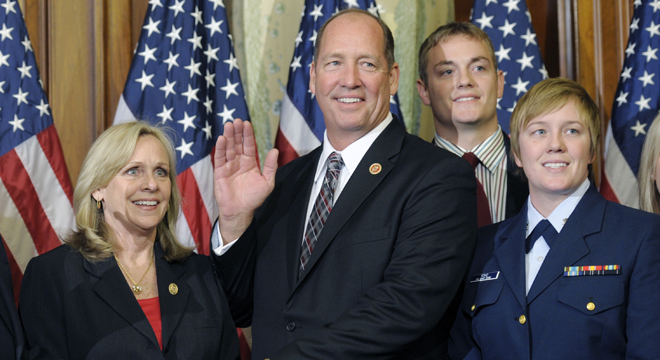Conservative Rep. Ted Yoho (R-FL) told constituents he isn’t entirely sure if the Civil Rights Act of 1964 is constitutional.
In a video uploaded Monday by the liberal Think Progress, Yoho appears to be at a town hall and is asked by a constituent if he believes that “any part” the landmark law — which prohibited discrimination on the basis of race, religion, color, sex and national origin — is constitutional.
“You know, this country grew through a lot of growing pain. We’re going through it again. And as we grow as a country and prosper, we’re going to go through it again in the future. That’s why I’m so thankful for the Constitution because it allows us to do that,” Yoho said. “Is it constitutional, the Civil Rights Act? I wish I could answer that 100 percent. I know a lot of things that were passed are not constitutional. But I know it’s the law of the land.”
The first-term congressman didn’t voice any substantive criticisms of the Civil Rights Act, a cultural touchstone which has become politically unassailable. His office didn’t respond by press time to queries on which parts of the act he believes may not be constitutional.
“We grew through the way our country started off with slavery, fought a war over it, a great war, and then went through the civil rights movement from that period to the ’60s,” the 59-year-old Floridian told his constituents in the video. His Gainesville-based district is very conservative, covering mostly rural areas and small towns.
Yoho isn’t the only prominent conservative in recent years to entertain the idea that the Civil Rights Act may be unconstitutional. In 2010, Rand Paul, running for Senate, questioned the validity of the act’s rule that private institutions must serve customers regardless of their race. (He later expressed strong support for the law.) The argument is rooted in a deeply conservative legal theory that the federal government has very limited power to regulate private acts.
“I don’t know how common it is these days,” Rick Hasen, a professor at UC Irvine School of Law, said in an email. “The main legal argument, made by conservatives (haven’t heard a liberal make it), is that Congress does not have the power to ban private acts of discrimination and that some regulation limiting what states can do [regarding] civil rights violates state sovereignty under the 10th Amendment.”






